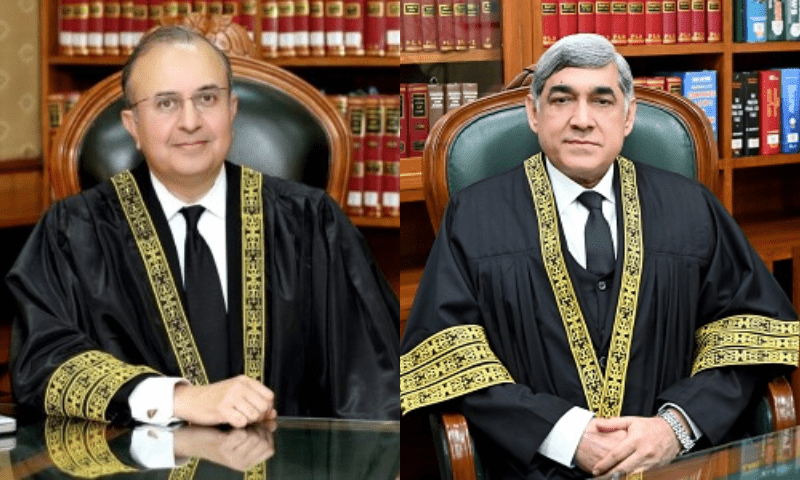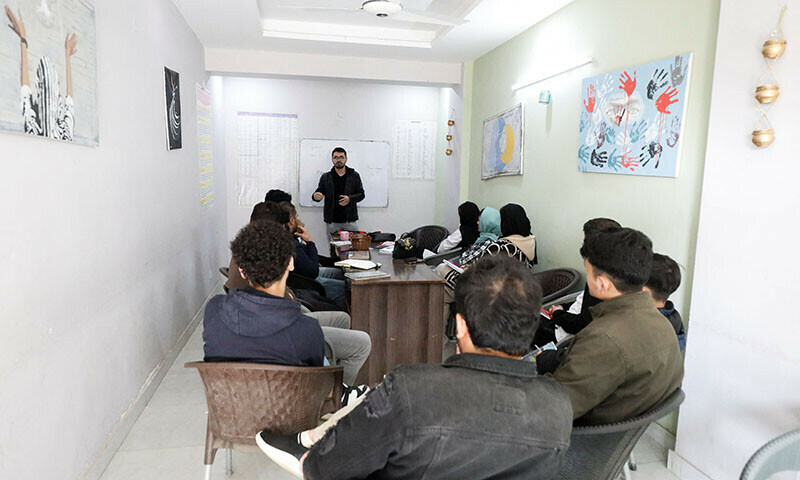• SC bench enlists Khawaja Haris Ahmed and Ahsan Bhoon as amici
• Judicial order cannot be trumped by administrative order, court told
ISLAMABAD: The Supreme Court on Wednesday continued to delve into the raging controversy whether a constitutional committee — set up under Article 191A of the Constitution — could undo the effect of a judicial order by withdrawing the jurisdiction of a regular bench that had already taken cognisance of the case.
The two-judge bench, comprising Justice Syed Mansoor Ali Shah and Justice Aqeel Ahmed Abbasi, resumed the case concerning non-fixation of the matter before the regular bench and contempt of court against Additional Registrar (Judicial) Nazar Abbas, who was removed by the court office on Tuesday.
The two-judge bench appointed senior counsel Khawaja Haris Ahmed and Ahsan Bhoon as amici curiae in addition to Muneer A. Malik and Hamid Khan, who were previously appointed.
The new amici were appointed when Attorney General for Pakistan (AGP) Mansoor Usman Awan pointed out that Munir Malik and Hamid Khan were already counsel in cases challenging the 26th amendment.
When Hamid Khan referred to Article 176 to say that SC will include a chief justice and other judges as determined by parliament, Justice Shah while pointing towards the AGP observed in a lighter note: “Are we ‘other’ judges for being members of the regular bench?”
Justice Abbasi also observed: “Now we have been rendered ‘others’!”
On Tuesday, Registrar Muhammad Saleem Khan had explained that the case was not fixed on Jan 20 because of the two decisions — by the regular committee constituted under Section 2 of the SC (Practice and Procedure) Act and the constitutional committee set up under Article 191(A)(4) of the Constitution.
The court had on Tuesday framed two questions by describing them as of great public importance namely: whether the two committees have the authority to withdraw a case from a regular bench hearing serious questions of constitutional law relating to the jurisdiction of the regular bench and whether these committees can, by an administrative order, undo the effect of a judicial order, whereby next date of hearing a specific case has been fixed before a regular bench.
On Wednesday, Munir Malik, argued through a video link from Karachi that two fundamental questions arose, namely: all the cases pending in the SC were to be first examined by the regular committee.
And only if a question arises that the matter ought to be sent to the constitutional committee, the case could be sent to the constitutional committee.
He stated that a judicial order cannot be trumped by an administrative order because that directly affects the judiciary’s independence, adding that a case being heard by a bench cannot be withdrawn through an administrative order.
He said these questions were of fundamental importance and went to the root of the independence of judiciary also submitting that it ought to be heard by the full court so that the matter was settled once and for all.
When asked whether such an order can be passed in contempt proceedings, he said, it could be as in the present case the very defence presented by the accused was that the case was not fixed before the court because of the decisions of the two committees that held its meeting on Jan 17.
Meanwhile, Hamid Khan referred to the court’s Jan 21 order and rephrased the questions earlier framed by the court by stating whether a judicial order and its implementation could be undone or varied by a committee exercising administrative and procedural powers and whether a constitutional question coming up before a bench could be decided by it or referred to the full court for its determination.
He then referred to Articles 175 and 176 to submit that the SC has been constituted under Article 175 and its constitution has been described under Article 176. Both these provisions, if read together, do not envisage any divisibility within the SC regarding the exercise of judicial power.
Advocate Shahid Jamil Khan, representing respondents in the main case, referred to Articles 204(c) and 175(2) to submit that the jurisdiction under Article 187 that authorises the apex court to do complete justice was also available to the bench and hence the committee’s decisions could be examined by the bench.
He submitted that the administrative order cannot override a judicial order and to the extent of inconsistency the administrative order was void.
He submitted that the question as to how the benches were to be regulated ought to be heard by the full court.
Meanwhile, Nazar Abbas sought time to file his written statement, which the court allowed.
Published in Dawn, January 23rd, 2025





Leave a Reply